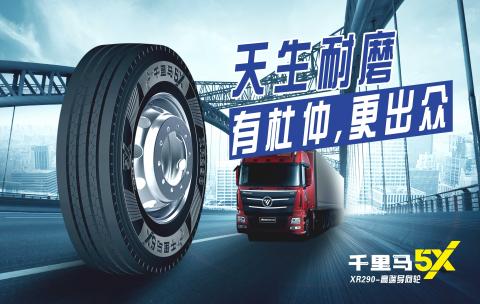|
New breakthrough of eucommia rubber in truck tire industrializationTime£º2020-05-20 As a cutting-edge and strategic new material, the industrial application of eucommia rubber in the tire industry has always been the concern of rubber enterprises. Recently, Jiangsu General Science Technology Co., Ltd. officially released the new high wear-resistant eucommia tire branded as Qianlima 5X XR290, which realized the new breakthrough of eucommia rubber in the industrialization application of all steel radial tire. This is also an important breakthrough of independent innovation in the tire industry, which will lay an important foundation for the large-scale application of eucommia rubber in the tire field. As we all know, the main material of traditional tire manufacturing is natural rubber. However, with the technological progress of tire industry and the rapid development of transportation logistics industry, consumer demands are more diversified. Through increasing investment in research and development, innovative application of new materials, optimization and upgrading of structural design and other ways to improve the comprehensive performance of tires and enhance the core competitiveness in the market, it has become a key issue for Chinese and foreign tire enterprises. Eucommia ulmoides is a unique resource in China. At present, China has more than 95% of eucommia ulmoides rubber resources in the world. It is of great strategic significance to study its application value. There are two kinds of eucommia rubber: natural eucommia rubber and synthetic eucommia rubber. Compared with natural rubber, eucommia rubber is characterized by fatigue resistance, high elasticity, especially better wear resistance, which is considered as one of the five new materials in tire field. Eucommia rubber has remarkable dual characteristics of rubber and plastic. It shows crystallinity at room temperature and is difficult to process, which limits its application in rubber field. Qianlima 5X XR290 adopts eucommia rubber tire tread formula technology, which effectively improves the comprehensive performance of pure natural rubber tire, solves the problems of bad abrasion resistance, high fuel consumption, poor driving performance, etc. in the use process of ordinary passenger car tire, not only improves the tire's wear resistance and flex fatigue resistance, but also makes the product's high-speed durability better, driving mileage increased by more than 30%. It effectively reduces the heat generation of tire in the mid-late life cycle, which makes high mileage and high durability become a stable guarantee and a new milestone in the industrial application of eucommia rubber.
At the same time, as the leader of Qianlima 5X series, XR290 has also been upgraded in the tire carcass, bead, tread and other parts. The use of ultra-high saturation four-line pattern increases the contact surface of the tire and the ground; the carcass adopts GS-AUT contour design technology to improve the rigidity of the tire bead and keep the tire upright, which makes the carcass more durable; the S-shaped semicircle anti-puncture groove design of the tread can effectively prevent the damage of the pattern groove; the optimization of the grounding design makes a more adequate contact surface with the ground and a more uniform stress, reduces irregular wear and improves safety performance. It is understood that the R & D team of Jiangsu General Science Technology has been engaged in the application research and development of eucommia rubber in the formula technology of passenger car tires since 2013. Through technical breakthrough, the technical neck of eucommia rubber, such as high hardness and difficult processing, has been broken through from formula design, process optimization and equipment improvement and upgrading. In 2018, GS realized the continuous production of synthetic eucommia rubber (TPI) in all steel radial tire for the first time in the industry, and reached the international advanced level through the appraisal of scientific and technological achievements. |










